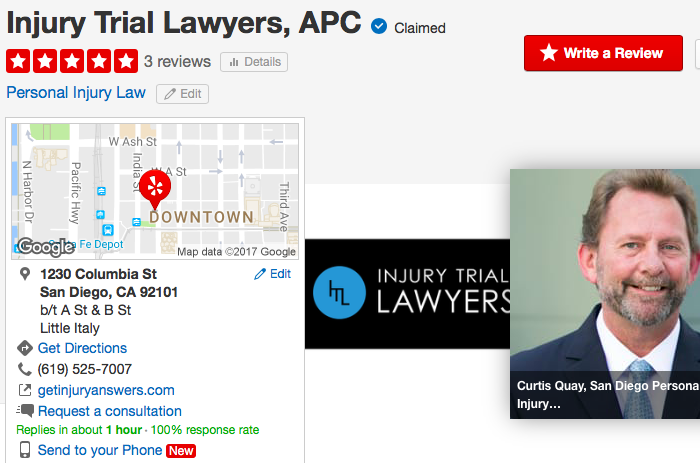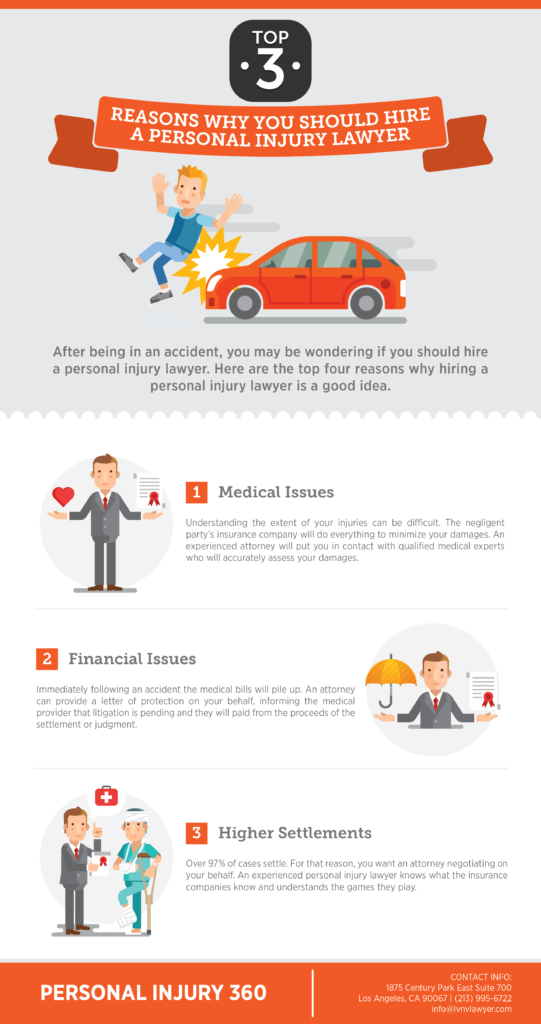Have you recently been hurt in an accident in San Diego? If so, you might be entitled to financial compensation. Hiring a San Diego personal injury lawyer will ensure you maximize the money you deserve. Read on to learn some tips on how to find the best personal injury lawyer in San Diego.
How Can a San Diego Personal Injury Attorney Help me After an Accident?
Personal injury cases can be challenging. That’s why it’s smart to hire an attorney to take care of every detail for you.
Here’s a look into what your personal injury lawyer will do:
- Listen to your story – probably multiple times on several different occasions – to get a sense of what happened.
- Answer all your personal injury questions.
- Research relevant statutes and case law to find the most compelling legal support for your personal injury case.
- Coordinate an investigation into your accident, enlisting the help of experts along the way.
- Gather and scrutinize evidence and relevant information – like physical evidence, accident reports, medical records, photographs, and witness statements.
- Prepare and submit a formal demand for compensation to the proper insurance agency.
- Handle negotiations with other parties and insurance company defense attorneys.
- Advise you of settlement offers and help you decide what to do (accept vs. reject).
- Build a civil lawsuit and submit your claim with the local court within the applicable statute of limitations.
- Serve defendants with copies of the complaint and personal injury lawsuit.
- Secure additional information during the discovery phase.
- Continue to negotiate in an effort to secure a fair deal as quickly as possible.
- Litigate your case in front of a judge and jury, if a settlement can’t be reached.
Don’t try to handle all of this on your own. Let your San Diego personal injury lawyer put their experience and legal skills to help you. After all, this is what they do every day.
How to Find the Best Personal Injury Lawyer in San Diego
The lawyer you choose for your injury case could have an enormous impact on the outcome. A lawyer provides advice to help you make decisions in your case. Your lawyer may negotiate on your behalf with insurance companies or advocate for you in front of a jury.
Most people will go through their lives without ever hiring a lawyer. For this reason, when an injury happens, you might not even know where to start your search or what to look for.
Here is some information about how to find the best personal injury lawyer in San Diego.
Understand Your San Diego Personal Injury Case
Before you can find a lawyer to represent you, you’ll need to understand the skills and experience that your lawyer will need. Understanding the nature of your case will help you to find a lawyer that can get the best result possible for you.
For example, if you suffered injuries due to a defective product, you probably need to find a law firm with experience in product liability cases. Similarly, when your injuries arise from a medical error, you need a lawyer who has experience and knowledge in medical malpractice cases.
Finding a San Diego injury lawyer to match up with your claim will ensure that they are comfortable handling the issues that may arise during the case. Although similar legal principles apply to a car accident and a semi-truck accident, a lawyer who lacks experience in dealing with commercial trucking companies and their insurers might get overwhelmed with a truck accident claim.
Some cases might also require a lawyer to have specific knowledge. Medical malpractice cases might require a much more detailed understanding of medicine and medical practices than other kinds of injury cases. Finding a lawyer with an understanding of the key matters in your case will help you to win or settle your case.
Research Your Personal Injury Attorney Options
Even after you determine the type of experience you need in a lawyer, you will still have many, many lawyers from which to choose. According to the State Bar of California, San Diego County has over 16,000 active lawyers. Over a thousand lawyers in the area practice injury law.
To create a manageable candidate pool, you will need to identify some criteria that you want your San Diego personal injury attorney to satisfy. Some of the ways you can research your candidates include:
1. Trusted Referrals
The best injury lawyers get referrals from past clients. When friends and family members recommend a lawyer, you can trust that the lawyer helped them to obtain good outcomes in their cases.
2. Other Lawyers
When a lawyer has the respect of their colleagues, you know that they can produce good outcomes. If you have a relative, friend, or neighbor that is a lawyer, give them a call. Ask them for the names of some respected San Diego injury lawyers.
Even if your contact does not practice injury law, they might have seen a good injury lawyer in court or heard about a lawyer who gets good outcomes.
3. Attorney Referral Services
The California Bar Association does not run a lawyer referral service, but many local bar associations and legal associations do. A lawyer referral service will give you the names of lawyers in your area who handle cases like yours. After you got the name, you can look them up on the California State Bar. Every attorney eligible to practice law in California has a profile that includes important information about their professional legal career. Click here to search for a specific attorney.
Organizations like the San Diego County Bar Association require lawyers to meet practice criteria and receive approval from a screening committee before they can be included in the program.
4. Lawyer Rating Services
Legal publications like AVVO and Martindale-Hubbell use proprietary rating systems to score lawyers.
AVVO uses public records from state bar associations, regulatory agencies, and courts to score lawyers. The score goes from 1 to 10. A lawyer with a good rating would have a six or higher score. Ideally, you want your lawyer to have a 10 Avvo rating, such as San Diego personal injury attorney David Muñoz. This rating is based on his experience, knowledge, and ethics.
Martindale-Hubbell uses surveys of clients and other lawyers to score a lawyer’s reputation for skill, knowledge, and ethics.
Both scores tend to give more reliable indicators of a lawyer’s reputation and background than user ratings on Yelp or Google. Users can manipulate Google and Yelp ratings up or down to give a misleading impression of a lawyer.
Questions to Ask a San Diego Personal Injury Lawyer During the Free Initial Consultation
Most injury lawyers provide a free consultation for new clients. Use this consultation to interview the lawyer.
As you talk to the lawyer, get a feel for their communication skills. An effective lawyer will be a good communicator.
An experienced San Diego personal injury attorney will have the ability to explain your legal options, negotiate with a claims adjuster, and persuade a jury. If you have a hard time following the lawyer or understanding the points the lawyer makes, it could mean that they’ll have trouble communicating with a claims adjuster or jurors.
Your injury case could take several months or even years of work. Think about how well your personalities mesh and how the lawyer will act as the representative of your case.
Some clients want tenacious and aggressive representation, while others want a more cooperative approach. Neither one is necessarily better than the other. It simply comes down to your personality and the type of person you’d like to work with.
Before your initial consultation, you should prepare some questions. A “free consultation” does not mean an “unlimited consultation.” Writing down some questions and topics to cover ahead of time will help you to make the most efficient use of your limited time.
Some questions to consider asking include:
1. How Much Do You Charge?
Many fee disputes arise from misunderstandings about how lawyers charge for their services. Use a free consultation to understand a lawyer’s fee structure.
Most injury lawyers charge a contingency fee. This means that the lawyer only receives a legal fee if you settle or win your case. If you lose or drop your case, the lawyer will not recover anything.
An injury lawyer will start on your case without any fees given upfront. Instead, the lawyer will take a percentage of the compensation you recover at the end of the case as payment for their services.
Ask the lawyer about the percentage charged. It’s typically between 33% and 40% – but that varies from case to case and firm to firm.
Make sure you understand how the lawyer bills for expenses apart from their legal representation, too. Some lawyers will expect reimbursement for court filing fees, court reporter fees, and expert witness fees, regardless of the outcome of your case.
2. Who Will Handle My Personal Injury Case?
In some law firms, partners or shareholders originate cases by meeting with clients, but they assign the cases to associates for the actual work. While this produces an efficient structure, some clients find it to be impersonal.
In smaller law firms, the lawyer you meet will likely handle your case. This can produce a more personal connection. But the lawyer might not have the time or support to handle larger cases, like a product liability case against a billion-dollar corporation.
3. How Will I Receive Updates?
The most common dispute between lawyers and clients arises from a lack of communication. Under California’s Rules of Professional Conduct, lawyers must keep clients reasonably informed about their cases and respond promptly to reasonable requests for updates.
When you talk to the lawyer, ask about the ways that you can contact the lawyer for updates. Also, ask about any others in the firm that can provide information about your case in the event that you cannot reach your lawyer.
Having the number and email address of the lawyer, paralegals, and legal secretaries working on your case will provide you with several paths for getting updates.
4. Have You Handled Cases Like Mine?
Experience instructs a lawyer in what works and what does not work. When you discuss your case, ask about other cases the lawyer has handled that had similar issues.
While you can hire a lawyer who doesn’t have any prior experience in cases like yours, you could face greater uncertainty throughout the case.
5. What Do You Think About My Personal Injury Case?
Very few cases are perfect. You want to know about the merits and problems in your case. A knowledgeable personal injury lawyer can identify both and discuss them with you so you can set your expectations accordingly.
An experienced San Diego personal injury lawyer should also explain the range of outcomes you could get in your case and rough probabilities for each outcome.
Most importantly, discuss the lawyer’s strategy for handling your case. This discussion will allow you to ask questions and provide input into the way that the lawyer will proceed.
Recommended San Diego Injury Lawyers
| Law Firm | Lawyer Name | Types of Cases Handled | Experience | Areas Served | Office Location | Case Results |
| Mission Personal Injury Lawyers, P.C. | David Muñoz | Minor injuries to major injuries
| 43+ years of combined experience | San Diego, Chula Vista, La Jolla, Oceanside, Carlsbad, Encinitas | 2515 Camino del Rio South 350
San Diego, CA
92108
619-777-5555 | Tens of millions of dollars |
Hamparyan Personal Injury
Lawyers San Diego, APC | Robert Hamparyan | Major injuries | 20+ years of experience | San Diego, Carlsbad, El Cajon, National City, Escondido | 2221 Las Palmas Dr, Suite H
Carlsbad, CA 92011 | 100 million recovered |
| Law Offices of Andrew H. Griffin III, APC | Andrew H. Griffin | Serious injuries only
| 30+ years of experience | San Diego, El Cajon, National City, Chula Vista | 275 E. Douglas Avenue, Suite 112
El Cajon, CA 92020 | Millions of dollars recovered |
Do I Have a San Diego Personal Injury Case?
Did you get hurt because someone else was careless? If so, you might have a personal injury case.
You might also have a case if the other person was cautious, but you got hurt, anyway. Under California law, they could potentially be strictly liable for your injuries. This is most often seen in situations involving defective products, inherently dangerous activities, and dog bites.
If you think you have a case – or need more legal information – speaking with a personal injury lawyer in San Diego is the best thing you can do.
Why Should I Hire a Personal Injury Lawyer?
On the fence about whether or not you should hire a personal injury lawyer after an accident in San Diego?
Here’s why you absolutely should:
- You’re statistically more likely to win your case.
- Hiring a lawyer is correlated with a bigger payout. Accident victims working with lawyers recover up to 3.5x as much in compensation than those who don’t.
- Insurance companies love to blame the victim. Sharing fault can destroy your injury case.
- Personal injury litigation is complicated – a single misstep can keep you from getting the money you need.
- You’ve got enough on your plate right now. Hiring a lawyer gives you time to really focus on getting better.
You’ve got one shot at winning your personal injury case. Hire a personal injury attorney to make the most of this opportunity.
How Much is My Personal Injury Case Worth?
It depends on a lot of different factors.
Consider:
- The type of injuries you’ve sustained and how severe they are
- What you’ve spent – and will have to spend – on medical care, rehabilitation, and other injury-related costs
- Other out-of-pocket expenses
- Whether your ability to work and generate an income has changed
- How you’ve been affected mentally and emotionally – what kind of pain and suffering have you endured?
- The extent to which you share some of the blame.
The more serious your injuries and suffering, the more your case is likely worth. But, valuation isn’t simple. Choose a lawyer who has experience building cases like yours and access to reliable resources to aid them throughout the process.
How Much Does a San Diego Personal Injury Lawyer Charge?
Nothing upfront. Then if (and only if) your lawyer wins your case, they’ll be paid a percentage of your financial recovery. This percentage varies but typically ranges between 33% and 40%.
What can affect an attorney’s contingency fee?
- Their overall legal experience, career, and reputation
- The lawyer’s specific experience handling cases like yours
- The type of case you have – some areas of personal injury law are highly specialized
- Where you live – an attorney in the city of San Diego will usually cost more than a lawyer practicing in a small rural part of California
These are just a few of the things that can impact what a particular attorney or personal injury lawyer will charge. Always discuss fees – and whether the lawyer’s fee comes from the gross or net recovery – before hiring representation.
When working on contingency, law firms take care of case-related costs and expenses.
This means they pay for things like:
- Filing fees
- Court costs
- Administrative expenses like copying, filing, and mailing
- Copies of police reports and medical records
- Costs associated with discovery, like the fee for a stenographer hired to document a deposition
- Expert witness fees
- Trial exhibits, and more.
If the lawyer’s fee is calculated using your gross recovery it’s taken right off the top. Then these costs are deducted from the remaining award. If the fee is calculated using the net award, it means these costs are deducted first. Either way, the amount that’s left is what you get to take home.
A personal injury lawyer should be forthcoming and transparent about their fee structure. If they’re not, that should be a red flag.
How Long Will My Personal Injury Case Take?
Ultimately, that’s up to you. Do you want to sacrifice the amount of money you get for a quick payout? Would you rather hold out for a bit, let your San Diego personal injury attorney work their magic, and apply pressure to get the defendant to pay up in full?
Regardless, settling your claim will take less time than going to trial. And a settlement doesn’t mean giving up value. But, good settlement terms take time. Your lawyer will need time to investigate, analyze evidence, research the law, work with experts, and build a solid foundation for your case.
A good personal injury attorney will keep you informed throughout the process. They’ll keep you updated on progress, roadblocks, and potential setbacks. They’ll also help you make important decisions when the time comes – like whether a settlement offer is good enough to accept or if you should press on.
What is the San Diego Personal Injury Claims Process?
The process of submitting a claim and/or filing a lawsuit after an accident in San Diego can be complicated. There are important deadlines that must be met and procedural rules that must be followed.
Here’s a brief overview of what you can expect:
- Investigation: An investigation will allow your attorney to get a clearer picture of what happened, gather evidence, and begin to build a claim for damages on your behalf.
- Notify Insurance Company: You’ll have up to two years to file a civil lawsuit after an accident in California – but insurance companies have special rules about insurance claims. Most require notice of an accident/injury within a reasonable timeframe. Failing to notify the insurer could lead to a denial of your claim.
- Submit a Demand Letter: A demand letter is your formal request for benefits from the at-fault party’s insurance provider. In it, you’ll tell your side of the story, explain why the insured party is at fault, and demand a specific amount of compensation for your injuries.
- Negotiations: Typically, insurance companies don’t agree to pay the full amount that’s requested in an initial demand letter. Rather, they’ll probably either deny the claim in full or come back with a counteroffer for less money. It’s up to you (and your lawyer) to decide whether to accept this lower offer or reject it and try to negotiate a higher payout.
- Filing a Complaint: If your claim is denied, if the insurer refuses to negotiate, or if your damages exceed the at-fault party’s policy limits, you can file a lawsuit. The process begins when you file a complaint with your local court and serve copies on the defendant.
- Discovery: The discovery phase allows both parties to gather additional information and evidence related to their cases. Your lawyer might conduct depositions, send interrogatories, or issue subpoenas during this process.
- Settlement: Most cases settle before they get to trial. Both parties privately negotiate the terms of a deal to avoid the cost and time of going to court.
- Trial: If a settlement can’t be reached, the case will head to trial. There, both sides will have the opportunity to argue their cases call and examine witnesses, introduce evidence, and present facts to a judge and jury.
San Diego personal injury lawyers know the process well – and also understand how to navigate it to get the bess results for their clients.
San Diego Accident Statistics
Accidents are incredibly common in San Diego. In fact, according to the County of San Diego
Department of the Medical Examiner, accidents are the leading cause of death in the area. In 2019, 50% of all deaths in San Diego County were the result of avoidable accidents. That’s one out of every two fatalities.
Not all accidents result in death. Most, in fact, are not fatal. But, they do leave victims struggling with serious injuries. In 2018, there were a total of 20,270 car accidents in San Diego County resulting in injury or death. More than a quarter of those – 5,607 – happened within San Diego’s city limits.
Which Personal Injury Attorney Should I Choose?
We hope all the information provided in this article will help you find the best San Diego personal injury attorney.
Remember, do not feel pressured to choose a personal injury lawyer during your free consultations. You should consider your decision carefully. But also bear in mind that your case may have impending deadlines that you cannot miss.
When you’re choosing a personal lawyer, you will need to prioritize your wants and needs. You may find lawyers with a wide range of experience, diverse backgrounds, and specific legal resources they can apply to your case. Choose the lawyer who will fulfill your needs and expectations for your case.
Additional San Diego Resources
San Diego Courts
San Diego Law Library
























